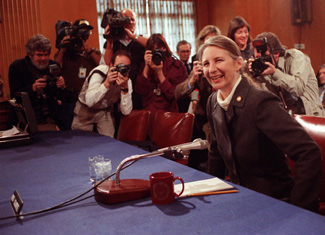| Home | Blog | Ask This | Showcase | Commentary | Comments | About Us | Contributors | Contact Us |

Talking about appeasement, let's go back to 1990COMMENTARY | September 254, 2006Gil Cranberg says, “The press could do worse than to remind Americans that our stumbles in Iraq didn’t just begin with the 2003 invasion but trace back more than a decade earlier to misguided moves to mollify and, yes, appease Saddam.” By Gilbert Cranberg Defense Secretary Donald Rumsfeld put the word “appeasement” in play with his recent speech comparing critics of the Iraq war to Neville Chamberlain’s pre-World War II efforts to placate Adolf Hitler. That reminded New York Times columnist Frank Rich Sept. 3 of Rumsfeld’s own history of making nice to a dictator: his 1983 visit to Baghdad to pump the hand of Saddam Hussein “in full fascist regalia” as Ronald Reagan’s emissary to show support for Iraq in its war with Iran. My own favorite appeasement vignettes also link to Iraq. In 1990, months before Iraq’s invasion of Kuwait, which triggered the first Iraq war, a delegation of five U.S. senators, among them Senator Bob Dole, went to Baghdad for a tête-à-tête with Saddam. Their most memorable message: don’t believe the press. Senator Alan Simpson, Republican of Wyoming, commiserated with Saddam: “I believe that your problems lie with the Western media, and not with the U.S. government. As you are isolated from the media, the press – and it is a haughty and pampered press – they all consider themselves political geniuses. That is, the journalists do. They are very cynical.” If currying favor with a dictator by telling him his troubles with the U.S. are all the fault of the press isn’t appeasement, what is? But wait, it gets worse. Three months later, with Iraqi troops poised to invade Kuwait, Saddam met with President George H.W. Bush’s ambassador to Iraq, April Glaspie, and got another dose of press bashing. In response to Saddam’s complaint about a campaign against him in the media, Glaspie told him: “I saw the Diane Sawyer program [”Prime Times Live”] on ABC. And what happened in that program was cheap and unjust. And this is a real picture of what happens in the American media – even to American politicians themselves. These are the methods the American media employs. I am pleased that you add your voice to the diplomats who stand up to the media. Because your appearance in the media, even for five minutes, would help us make the American people understand Iraq. This would increase mutual understanding. If the American president had control of the media, his job would be much better.” Saddam had thought to have the session transcribed, and he released the text, which Glaspie denounced as a “fabrication” and “disinformation.” Unfortunately for her, she had sent a cable to the State Department about her meeting with Saddam, which soon surfaced, and it showed that Saddam’s text was essentially accurate. Glaspie’s slurs against the U.S. media were part of a week-kneed presentation that could well have been taken by Saddam as a green light to attack Kuwait, with which he had a border disagreement. At one point, Glaspie told him that the U.S. takes “no position” on Arab border disputes. Leslie Gelb, a New York Times columnist at the time, wrote that Glaspie “simply slobbered all over Saddam,” but Gelb faulted Bush more than Glaspie for not forcefully telling Saddam to stay out of Kuwait. Secretary of State James Baker subsequently conceded that strong warnings might have averted the war. With talk of appeasement in the air, it’s worth recalling what has to rank as among the most egregious missteps by high U.S. government officials in dealing with a dictator. The press could do worse than to remind Americans that our stumbles in Iraq didn’t just begin with the 2003 invasion but trace back more than a decade earlier to misguided moves to mollify and, yes, appease Saddam.
|




